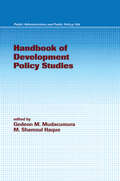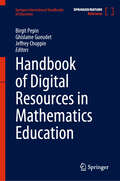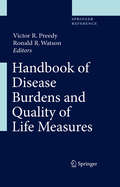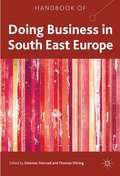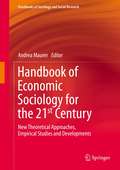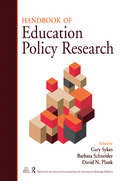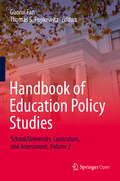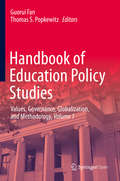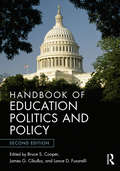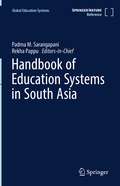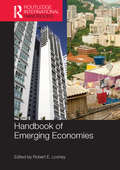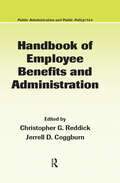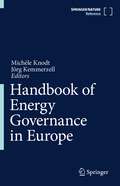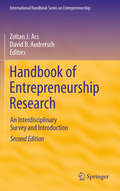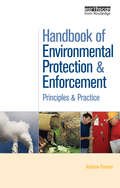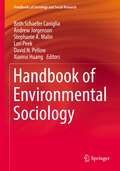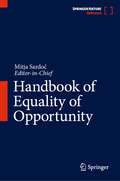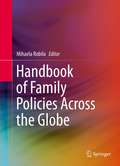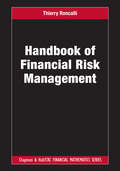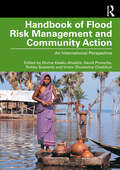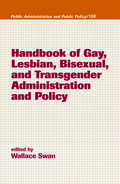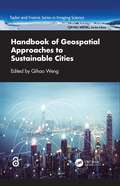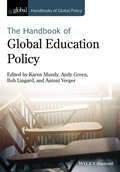- Table View
- List View
Handbook of Development Policy Studies (Public Administration and Public Policy)
by Trevor R. HodkinsonConsidering the current challenges to human progress, this reference book examines recent theories, policies, and sectoral priorities, as well as various social, economic, and administrative factors that impact worldwide modernization and development. The book emphasizes the fact that communities must evaluate continuously and adjust their program
Handbook of Digital Resources in Mathematics Education (Springer International Handbooks of Education)
by Ghislaine Gueudet Jeffrey Choppin Birgit PepinThis handbook presents the state-of-the art scholarship on theoretical frames, mathematical content, learning environments, pedagogic practices, teacher professional learning, and policy issues related to the development and use of digital resources in mathematics education. With the advent of more and more open access digital resources, teachers choose from the web what they see fit for their classroom; students choose ‘in the moment’ what they need for their projects and learning paths. However, educators and students often find it difficult to choose from the abundance of materials on offer, as they are uncertain about their quality and beneficial use. It is clear that at a time of bouleversement of the teaching-learning processes, it is crucial to understand the quality and the (potentially) transformative aspects of digital resources. This book provides comprehensive analyses of and insights into the transformative aspects of digital resources.
Handbook of Disease Burdens and Quality of Life Measures
by Victor R. Preedy Ronald R. WatsonThis handbook features in-depth reviews of disability-adjusted life years (DALYs), quality-adjusted life years (QALYs), quality of life and financial measures for over 120 diseases and conditions. Its editors have organized this critical information for maximum access and ease of use, with abstracts, definitions of key terms, summary points, and dozens of figures and tables that can enhance the text or stand alone.
Handbook of Doing Business in South East Europe
by Dietmar Sternad Thomas D�ringA comprehensive insight into a region which is characterized by rapid economic and social changes with a significant rise in foreign direct investments and privatization. Analysis covers political, legal, economic and social trends,and topics such as the influence of informal networks and corruption, as well as cultural diversity.
Handbook of Economic Sociology for the 21st Century: New Theoretical Approaches, Empirical Studies and Developments (Handbooks of Sociology and Social Research)
by Andrea MaurerThis handbook provides an overview on major developments that occurred in the field of economic sociology after its rebirth since the 1980s in the US. It offers new insights on the uniqueness of European economic sociology compared to US economic sociology which emerged at the end of the 20th century. The handbook presents economic sociology as a developing field which started with certain foundations as new economic sociology, widening the perspective by introducing social factors thereby focusing more on general belief systems, social forms of coordination and the relationships between society and the economy. It offers an outstanding portrait of the research field helping to identify major foundations and trajectories as well as new research perspectives for a globalized economic sociology. This makes the handbook appeal to specialized researchers of the field, researchers from other disciplines interested in economic phenomena, as well as graduate and postgraduate students.
Handbook of Education Policy Research
by Barbara Schneider Gary Sykes David N. Plank Timothy G. FordCo-published by Routledge for the American Educational Research Association (AERA) Educational policy continues to be of major concern. Policy debates about economic growth and national competitiveness, for example, commonly focus on the importance of human capital and a highly educated workforce. Defining the theoretical boundaries and methodological approaches of education policy research are the two primary themes of this comprehensive, AERA-sponsored Handbook. Organized into seven sections, the Handbook focuses on (1) disciplinary foundations of educational policy, (2) methodological perspectives, (3) the policy process, (4) resources, management, and organization, (5) teaching and learning policy, (6) actors and institutions, and (7) education access and differentiation. Drawing from multiple disciplines, the Handbook’s over one hundred authors address three central questions: What policy issues and questions have oriented current policy research? What research strategies and methods have proven most fruitful? And what issues, questions, and methods will drive future policy research? Topics such as early childhood education, school choice, access to higher education, teacher accountability, and testing and measurement cut across the 63 chapters in the volume. The politics surrounding these and other issues are objectively analyzed by authors and commentators. Each of the seven sections concludes with two commentaries by leading scholars in the field. The first considers the current state of policy design, and the second addresses the current state of policy research. This book is appropriate for scholars and graduate students working in the field of education policy and for the growing number of academic, government, and think-tank researchers engaged in policy research. For more information on the American Educational Research Association, please visit: http://www.aera.net/.
Handbook of Education Policy Studies: School/University, Curriculum, and Assessment, Volume 2
by Thomas S. Popkewitz Guorui FanThis open access handbook brings together the latest research from a wide range of internationally influential scholars to analyze educational policy research from international, historical and interdisciplinary perspectives. By effectively breaking through the boundaries between countries and disciplines, it presents new theories, techniques and methods for contemporary education policy, and illustrates the educational policies and educational reform practices that various countries have introduced to meet the challenges of continuous change.This volume focuses on policies and changes in schools and classrooms. The studies on school changes present the differences in the policies and challenges of K-12 schools and universities in different countries and regions, and in connection with the contradictions and conflicts between tradition and modernization, as well as the changing roles of various stakeholders, especially that of teachers. In terms of curriculum and instruction, many countries have undertaken experiments and introduced changes based on two major themes: “what to teach” and “how to teach”. International education assessments represented by PISA not only promote the improvement and extensive application of educational assessment and testing techniques, but have also had far-reaching impacts on education policies and education reforms in many countries.Focusing on the changes in educational policies at the micro level, this volume comprehensively reveals the complex interactions between school organizations, teachers, curricula, teaching and learning, evaluation and other elements within the education system, as well as the latest related reforms worldwide.
Handbook of Education Policy Studies: Values, Governance, Globalization, and Methodology, Volume 1
by Thomas S. Popkewitz Guorui FanThis open access handbook brings together the latest research from a wide range of internationally influential scholars to analyze educational policy research from international, historical and interdisciplinary perspectives. By effectively breaking through the boundaries between countries and disciplines, it presents new theories, techniques and methods for contemporary education policy, and illustrates the educational policies and educational reform practices that various countries have introduced to meet the challenges of continuous change.Based on an analysis of the nature of education policy and education reform, this volume focuses on education reform and the concept of education quality. Adopting a historical and comparative perspective, it examines the dialectical relationship between education policy and education reform in various countries, assesses theoretical and practical issues in the process of moving from regulation to multiple governance in contemporary education administration, and explores the impact of globalization on national education reform and the interdependence between countries. In addition, it presents studies addressing educational policy research methodology from multiple perspectives.Highlighting the changes in national education macro policies, this volume comprehensively reveals the complex relationship between contemporary education reform and social change, and explores the links between contemporary social, political and economic systems and educational policy research and practice, offering a holistic portrait of macro trends in contemporary education reform.
Handbook of Education Politics and Policy
by Bruce S. Cooper James G. Cibulka Lance D. FusarelliThis revised edition of the Handbook of Education Politics and Policy presents the latest research and theory on the most important topics within the field of the politics of education. Well-known scholars in the fields of school leadership, politics, policy, law, finance, and educational reform examine the institutional backdrop to our educational system, the political behaviors and cultural influences operating within schools, and the ideological and philosophical positions that frame discussions of educational equity and reform. In its second edition, this comprehensive handbook has been updated to capture recent developments in the politics of education, including Race to the Top and the Common Core State Standards, and to address the changing role politics play in shaping and influencing school policy and reform. Detailed discussions of key topics touch upon important themes in educational politics, helping leaders understand issues of innovation, teacher evaluation, tensions between state and federal lawmakers over new reforms and testing, and how to increase student achievement. Chapter authors also provide suggestions for improving the political behaviors of key educational groups and individuals with the hope that an understanding of political goals, governance processes, and policy outcomes may contribute to ongoing school reform.
Handbook of Education Systems in South Asia (Global Education Systems)
by Padma M. Sarangapani Rekha PappuThis handbook is an important reference work in understanding education systems in the South Asia region, their development trajectory, challenges and potential. The handbook includes the SAARC (South Asian Association for Regional Cooperation) countries for discussion---Afghanistan, Pakistan, India, Nepal, Bhutan, Bangladesh, and Sri Lanka---while also considering countries such as Myanmar and the Maldives that have considerable shared history in the region. Such a comparative perspective is largely absent within the literature given the present paucity of intra-regional interaction. South Asian education systems are viewed primarily through a development lens in terms of inequalities, challenges and responses. However, the development of modern institutions of education and the challenges that it faces requires cultural and historical understanding of indigenous traditions as well as indigenous modern thinkers and education movements. Therefore, this encompassing reference work covers indigenous education traditions, formal education systems, including school and preschool education, higher and professional education, education financing systems and structures, teacher education systems, addressing huge linguistic and other diversities, and marginalization within the formal education system, and pedagogy and curricula. All the countries in this region have their own unique geographical, cultural, economic and political character and histories of interest and significance, and have responded to common issues such as overcoming the colonial legacy, language diversity, or girls’ education, or minority rights in education, in uniquely different ways. The sections therefore include country-specific perspectives as far as possible to highlight these issues. Internationally renowned specialists of South Asian education systems have contributed to this important reference work, making it an invaluable resource for researchers and students of education interested in South Asia.
Handbook of Emerging Economies (Routledge International Handbooks Ser.)
by Robert E. LooneyA major new volume in the Routledge International Handbooks series analysing emerging and newly emerged economies, including the BRICS countries (Brazil, Russia, India, China and South Africa) and other likely (Turkey, Indonesia, Mexico, and South Korea) as well as possible (Vietnam, The Philippines, Nigeria, Pakistan, Egypt, Colombia and Argentina) candidates for emerging economy status. Chapters on theories surrounding emerging markets (including the Beijing/Washington Consensus debate) offer an overview of current issues in development economics, in addition to providing an integrated framework for the country case studies. Written by experts, this handbook will be invaluable to academics and students of economics and emerging economies, as well as to business people and researchers seeking information on economic development and the accelerating pace of globalization.
Handbook of Employee Benefits and Administration (Public Administration and Public Policy)
by Christopher G. Reddick Jerrell D. CoggburnFiscal realities and changing social priorities are requiring a dramatic shift in the way that benefits are selected and awarded to employees, especially in the public sector. This means that public administrators and policy researchers must consider new parameters and contingencies, both financial and social, when evaluating choices and making pol
Handbook of Energy Governance in Europe
by Michèle Knodt Jörg KemmerzellThis Handbook provides the most comprehensive account of energy governance in Europe, examining both energy governance at the European level and the development of energy policy in 30 European countries. Authored by leading scholars, the first part of the book offers a broad overview of the topics of energy research, including theories of energy transitions, strategies and norms of energy policy, governance instruments in the field, and challenges of energy governance. In the second part, it examines the internal and external dimensions of energy governance in the European Union. The third part presents in-depth country studies, which investigate national trajectories of energy policy, including an analysis of the policy instruments and coordination mechanisms for energy transitions. It closes with a comparative analysis of national energy governance. This book is a definitive resource for scholars in energy and climate research as well as decision makers in national governments and EU institutions.
Handbook of Entrepreneurship Research
by Zoltan J. Acs David B. AudretschInterest in and attention to entrepreneurship has exploded in recent years. Nevertheless, much of the research and scholarship in entrepreneurship has remained elusive to academics, policymakers and other researchers, in large part because the field is informed by a broad spectrum of disciplines, including management, finance, economics, policy, sociology, and psychology, often pursued in isolation from each other. Since its original publication in 2003, the Handbook of Entrepreneurship Research has served as the definitive resource in the field, bringing together contributions from leading scholars in these disciplines to present a holistic, multi-dimensional approach. This new edition, fully revised and updated, and including several new chapters, covers all of the primary topics in entrepreneurship, including entrepreneurial behavior, risk and opportunity recognition, equity financing, business culture and strategy, innovation, and the impact of entrepreneurship on economic growth and development. Featuring an integrative introduction, extensive literature reviews and reference lists, the Handbook will continue to serve as a roadmap to the rapidly evolving and dynamic field of entrepreneurship.
Handbook of Environmental Protection and Enforcement: Principles and Practice
by Andrew FarmerEnvironmental Enforcement Authorities (EEAs), sometimes called Environmental Protection Agencies (EPAs), are the regulatory, monitoring and enforcement agencies of national, state/provincial and local governments worldwide responsible for implementing, monitoring and enforcing environmental legislation. This one-of-a-kind, authoritative handbook offers a comprehensive assessment of the principles and best practice of EEAs throughout the world with a focus on Europe, the USA, Canada, Australia, east and south-east Asia and various other OECD, transition and developing countries. The book assesses structures, expertise and capacity, financing, permitting, monitoring, inspection, enforcement and EEA performance and future directions. It also identifies best practice for creating or improving EEAs. It offers substantial information for industry on the nature of compliance with environmental regulations as well as vital information for professionals, consultants, NGOs and researchers working at the interface between government EEAs and industry.
Handbook of Environmental Sociology (Handbooks of Sociology and Social Research)
by Lori Peek David N. Pellow Stephanie A. Malin Beth Schaefer Caniglia Andrew Jorgenson Xiaorui HuangThis handbook defines the contours of environmental sociology and invites readers to push boundaries in their exploration of this important subdiscipline. It offers a comprehensive overview of the evolution of environmental sociology and its role in this era of intensified national and global environmental crises. Its timely frameworks and high-impact chapters will assist in navigating this moment of great environmental inequality and uncertainty. The handbook brings together an outstanding group of scholars who have helped redefine the scope of environmental sociology and expand its reach and impact. Their contributions speak to key themes of the subdiscipline—inequality, justice, population, social movements, and health. Chapter topics include environmental demography, food systems, animals and the environment, climate change, disasters, and much more. The emphasis on public environmental sociology and the forward-thinking approach of this collection is what sets this volume apart. This handbook can serve as an introduction for students new to environmental sociology or as an insightful treatment that current experts can use to further their own research and publication. It will leave readers with a strong understanding of environmental sociology and the motivation to apply it to their work.
Handbook of Equality of Opportunity
by Mitja SardočThis Handbook provides an authoritative exposition of equality of opportunity. It presents the different concepts most commonly associated with equality of opportunity, and discusses the many problems dominating the controversies on equality of opportunity at the theoretical, policy or practical level. The chapters give a concise exposition of the different conceptions and basic concepts of equal opportunities. They clarify variables that are part of the 'algorithm of equal opportunities', e.g. opportunity, equality, non-discrimination, fairness, responsibility, chance and choice, excellence, qualifications, effort, talent, merit, desert, inequality, and risk. The idea of equality of opportunity has traditionally been associated with a set of largely unquestioned ideals, and over the last 50 years, it has been at the very centre of the major progressive social changes and firmly entrenched in political rhetoric. Yet, the idea of equality of opportunity is far from unquestionable or unproblematic as the only solid assumption different conceptions have in common is their rejection of fixed social relations but not hierarchy itself. Disagreements over the fundamental principles, criticism over the inefficiency of policies aiming to ensure equal opportunities, and objections to their unfairness, all pose questions that current conceptions answer in different ways. This Handbook examines a wide variety of questions about issues of motivation, procedures, genealogy, taxonomy, and compensation.
Handbook of Families in the Arab Gulf States (Gulf Studies #19)
by Md Mizanur Rahman Ziarat Hossain Kaltham Al-Ghanim Sharique UmarThis open access book collates and advances the body of knowledge about the factors, directions, and magnitudes of change in Arabian Gulf families from interdisciplinary perspectives. Family life across the globe is being impacted by unprecedented diversity in household living arrangements and by sweeping economic, cultural, and social change, and this is not an exception in the Gulf region. The book demarcates how Gulf families are experiencing many formidable challenges and undergoing profound changes due to speedy economic transformation, educational reforms, extensive use of social media, rapid urbanization, migration, women empowerment, and the intersections of popular culture from both the East and the West. Notwithstanding such challenges and changes, Gulf families often seem to retain and continue many of the traditional roles and functions of families in a sustained manner. It contributes to current debates that revolve around questions of what has changed, and what has stayed the same, in family structures in the region. Sweeping and comparative, the book provides avenues for offering practical solutions for policy interventions in Kuwait, the United Arab Emirates, Qatar, Bahrain, Oman, and Saudi Arabia. It is a key academic text for sociologists interested in transformations in the family in relation to politics, economics, consumption patterns, education, gender, law, social media, religion, culture, social reforms, and the state.
Handbook of Family Policies Across the Globe
by Mihaela RobilaFamily Policies Across the Globe provides comprehensive coverage of explicit and implicit family policies from an international perspective. The coverage includes issues such as family-friendly work practices, work-life balance, childcare, poverty, domestic violence, social exclusion/inclusion, immigration, and disability. The chapters explore what types of family policies exist in different countries or geographical areas, what are some of challenges encountered in developing, implementing, and evaluating them, and provides recommendations for an evidence-based policy making process.
Handbook of Financial Risk Management (Chapman and Hall/CRC Financial Mathematics Series)
by Thierry RoncalliDeveloped over 20 years of teaching academic courses, the Handbook of Financial Risk Management can be divided into two main parts: risk management in the financial sector; and a discussion of the mathematical and statistical tools used in risk management. This comprehensive text offers readers the chance to develop a sound understanding of financial products and the mathematical models that drive them, exploring in detail where the risks are and how to manage them. Key Features: Written by an author with both theoretical and applied experience Ideal resource for students pursuing a master’s degree in finance who want to learn risk management Comprehensive coverage of the key topics in financial risk management Contains 114 exercises, with solutions provided online at www.crcpress.com/9781138501874
Handbook of Flood Risk Management and Community Action: An International Perspective
by Divine Kwaku Ahadzie, David Proverbs, Robby Soetanto and Victor Oluwasina OladokunRecurring and worsening flood incidence around the world has necessitated the understanding and strengthening of community-based flood risk management from an international perspective. This handbook emphasises the need for community action as part of an integrated flood risk management approach, highlighting case studies that have received recognition and made positive impacts, resulting in resilience-enhancing actions which can improve global community understanding. The content has been arranged such that it covers flood risk management approaches in the three main interfaces of before, during and after the flood event. Experts writing on case studies from Africa, Oceania, Europe, Asia and the Americas come together to present lessons from regional and continental experiences that will be useful in providing an understanding of the nature and effectiveness of the human-centred approach. The successful implementation of local and scientific knowledge as complementary measures is also highlighted in a systematic review on the use of technologies for flood risk reduction. This interesting and diverse range of contributions seeks to showcase opportunities for cross-cultural knowledge transfer and uptake in the field of flood risk management. This handbook is essential reading for researchers, policy makers and leaders involved in flood and disaster management in the built environment, risk assessment, environmental and civil/construction engineering and community action planning.
Handbook of Gay, Lesbian, Bisexual, and Transgender Administration and Policy (Public Administration and Public Policy)
by Wallace SwanRecording issues and obstacles as well as groundbreaking victories in the recognition of gay, lesbian, bisexual, and transgender (GLBT) rights in politics and policy, this landmark handbook introduces core considerations necessary for prompting governmental initiatives and social structures to better serve the GLBT population. Its impressive range
Handbook of Geospatial Approaches to Sustainable Cities (Imaging Science)
by Qihao Weng Cheolhee YooThis comprehensive handbook presents the current state of knowledge on geospatial technologies, techniques, and methods that are imperative for providing solutions to sustainable cities. It addresses the role of geospatial big data and AI techniques and how they are applied when analyzing the sustainability of urban development, land use, urban planning, and resource management, as well as monitoring the impact urbanization has on the environment and the ecosystem. Taking an interdisciplinary approach to sustainable cities, and with contributions from renowned experts around the world, this holistic handbook is a toolbox for geospatial, urban, and sustainability professionals, the artificial intelligence community, and those who work in related fields.Features: Explores cutting-edge geospatial and AI techniques in support of efficient, resilient, digital, and smart cities Bridges urban science and sustainability science via geospatial methods Contributes to the efforts of GEO by addressing and exemplifying pertinent societal benefit areas and engagement priorities Includes 16 case studies with a broad geographic scope that integrate societal needs with technological advances Draws expertise in geospatial technology, big data, and artificial intelligence from leading experts in the world This book is intended for researchers and scientists interested in learning techniques in GeoAI, including the technologies for collecting, analyzing, managing, processing, and visualizing geospatial datasets. Chapters 3, 6, 7, 8, and 15 of this book are freely available as a downloadable Open Access PDF at http://www.taylorfrancis.com under a Creative Commons Attribution-Non Commercial-No Derivatives (CC BY-NC-ND) 4.0 license.
Handbook of Giftedness in Children: Psychoeducational Theory, Research, and Best Practices
by Steven I. PfeifferIn one comprehensive resource, this superb handbook covers everything you need to know about the subject. It brings together leading experts from the fields of psychology and education, combining theory and applied empirical research on such crucial topics as conceptualization, types of intelligence, developmental considerations, and ethical and legal concerns. Particular attention is given to social and family contexts, and evidence-based strategies and interventions offer solid guidelines on assessment, curriculum design, and encouraging and nurturing talent – from preschool through adolescence.
Handbook of Global Education Policy (Handbooks of Global Policy)
by Andy Green Karen Mundy Bob Lingard Antoni VergerThis innovative new handbook offers a comprehensive overview of the ways in which domestic education policy is framed and influenced by global institutions and actors. Surveys current debates about the role of education in a global polity, highlights key transnational policy actors, accessibly introduces research methodologies, and outlines global agendas for education reform Includes contributions from an international cast of established and emerging scholars at the forefront of the field thoughtfully edited and organized by a team of world-renowned global education policy experts Each section features a thorough introduction designed to facilitate readers’ understanding of the subsequent material and highlight links to interdisciplinary global policy scholarship Written in an accessible and engaging style that will appeal to domestic and international policy practitioners, social scientists, and education scholars alike
